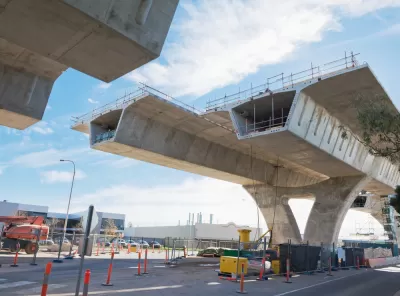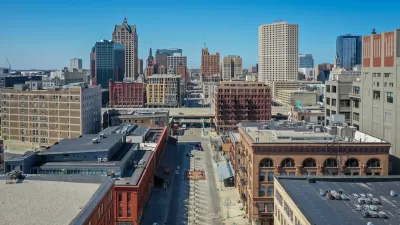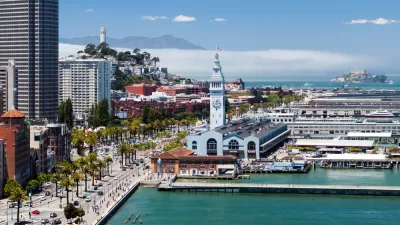Communities divided by freeways for decades are now looking to reconnect, and the U.S. Department of Transportation is stepping in to offer support.

The pendulum on new highway construction seems to be swing backwards now as more cities look to tear down, bury or bridge over existing freeways that have divided communities for years. Pete Bigelow of Car and Driver writes that the movement to break down the physical barriers caused by the interstate freeway system cutting through cities has gained strong support from U.S. Department of Transportation Secretary Anthony Foxx. Last month, the Dept. of Transportation launched the Every Place Counts design challenge, with the goal of finding creative solutions to stitch back together neighborhoods and communities divided by highways in cities around the country. Foxx and his team toured Philadelphia, Nashville, Spokane, and Minneapolis and spoke with locals about potential solutions.
Unlike the Smart City Challenge, a recent DOT competition that ultimately awarded $40 million in federal funds to Columbus, Ohio, to implement an innovative network of connected transportation options, there’s no funding attached to the Every Place Counts challenge. At this stage, the support is only in technical planning, though transportation officials say they’ll help communities pursue funds for implementation.
But both competitions highlight the way federal officials are examining transportation’s role in revitalizing urban cores and helping some of the country’s poorest residents gain access to health care, education, public spaces, and better jobs. In the case of Every Place Counts, the program is analyzing how transportation contributed to these problems in the first place.
As Bigelow notes, the idea of freeway removal is still relatively new, with opponents expressing fears of gridlock and suffering business. However, as case studies in Portland, Milwaukee, and San Francisco have shown, these fears are largely unfounded.
FULL STORY: The Future of Neighborhoods: Removing Urban Freeways Gains Fresh Traction

Planetizen Federal Action Tracker
A weekly monitor of how Trump’s orders and actions are impacting planners and planning in America.

Restaurant Patios Were a Pandemic Win — Why Were They so Hard to Keep?
Social distancing requirements and changes in travel patterns prompted cities to pilot new uses for street and sidewalk space. Then it got complicated.

Map: Where Senate Republicans Want to Sell Your Public Lands
For public land advocates, the Senate Republicans’ proposal to sell millions of acres of public land in the West is “the biggest fight of their careers.”

Maui's Vacation Rental Debate Turns Ugly
Verbal attacks, misinformation campaigns and fistfights plague a high-stakes debate to convert thousands of vacation rentals into long-term housing.

San Francisco Suspends Traffic Calming Amidst Record Deaths
Citing “a challenging fiscal landscape,” the city will cease the program on the heels of 42 traffic deaths, including 24 pedestrians.

California Homeless Arrests, Citations Spike After Ruling
An investigation reveals that anti-homeless actions increased up to 500% after Grants Pass v. Johnson — even in cities claiming no policy change.
Urban Design for Planners 1: Software Tools
This six-course series explores essential urban design concepts using open source software and equips planners with the tools they need to participate fully in the urban design process.
Planning for Universal Design
Learn the tools for implementing Universal Design in planning regulations.
Heyer Gruel & Associates PA
JM Goldson LLC
Custer County Colorado
City of Camden Redevelopment Agency
City of Astoria
Transportation Research & Education Center (TREC) at Portland State University
Camden Redevelopment Agency
City of Claremont
Municipality of Princeton (NJ)





























